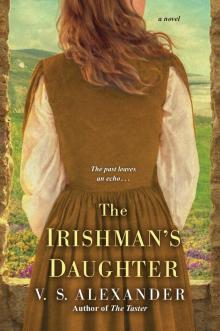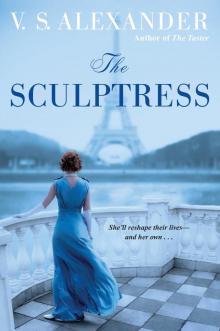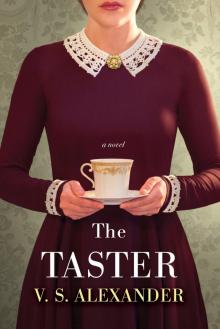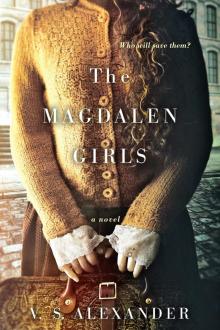- Home
- V. S. Alexander
The Sculptress
The Sculptress Read online
Outstanding praise for the novels of V. S. Alexander
The Irishman’s Daughter
“Skillfully blends family ties with the horrors of a starving country and the hopefulness of young love.”
—Booklist
“Written with hope for a better tomorrow, V. S. Alexander gives readers an intimate heart-wrenching account of the unimaginable suffering of those who clawed their way through Ireland’s darkest years.”
—BookTrib
The Taster
“Alexander’s intimate writing style gives readers openings to ’wonder about what tough decisions they would have made in Magda’s situation. The ‘taster’s’ story adds to a body of nuanced World War II fiction such as Elizabeth Wein’s Code Name Verity, Anthony Doerr’s All the Light We Cannot See, and Tatiana de Rosnay’s Sarah’s Key. Book clubs and historical fiction fans will love discussing this and will eagerly await more from Alexander.”
—Library Journal
“A totally gripping and credible imagining of how a young German woman was affected by the building chaos and cruelty during the late stages of Hitler’s rule. It gains its power through the very special perspective of its main character, who is also the narrator.... Through her, Mr. Alexander creates an impressive and engaging novel that humanizes historical events and provides the rich texture of a life meeting momentous challenges in momentous times.”
—Florida Weekly
The Magdalen Girls
“A haunting novel that takes the reader into the cruel world of Ireland’s Magdalene laundries, The Magdalen Girls shines a light on yet another notorious institution that somehow survived into the late twentieth century. A real page-turner!”
—Ellen Marie Wiseman, author of The Life She Was Given
“Alexander has clearly done his homework. Chilling in its realism, his work depicts the improprieties long condoned by the Catholic Church and only recently acknowledged. Fans of the book and film Philomena will want to read this.”
—Library Journal
Books by V. S. Alexander
THE MAGDALEN GIRLS
THE TASTER
THE IRISHMAN’S DAUGHTER
THE TRAITOR
THE SCULPTRESS
Published by Kensington Publishing Corp.
The SCULPTRESS
V. S. ALEXANDER
www.kensingtonbooks.com
All copyrighted material within is Attributor Protected.
Table of Contents
Praise
Also by
Title Page
Copyright Page
Dedication
PART ONE - VERMONT and MASSACHUSETTS 1905–1917
CHAPTER 1
PART TWO - BOSTON MAY 1917
CHAPTER 2
CHAPTER 3 - BOSTON
PART THREE - THE ATLANTIC AND FRANCE AUGUST 1917
CHAPTER 4
CHAPTER 5 - PARIS AND THE FRONT
CHAPTER 6 - PARIS
PART FOUR - PARIS JULY 1918
CHAPTER 7
CHAPTER 8 - PARIS AND TOUL
CHAPTER 9 - PARIS
CHAPTER 10 - PARIS
PART FIVE - BOSTON JANUARY 1919
CHAPTER 11
CHAPTER 12 - BOSTON
CHAPTER 13 - BOSTON
AUTHOR’S NOTE
THE SCULPTRESS
DISCUSSION QUESTIONS
This book is a work of fiction. Names, characters, and incidents either are products of the author’s imagination or are used fictitiously. Any resemblance to actual persons living or dead, or events, is entirely coincidental.
KENSINGTON BOOKS are published by
Kensington Publishing Corp.
119 West 40th Street
New York, NY 10018
Copyright © 2021 by Michael Meeske
All rights reserved. No part of this book may be reproduced in any form or by any means without the prior written consent of the Publisher, excepting brief quotes used in reviews.
To the extent that the image or images on the cover of this book depict a person or persons, such person or persons are merely models, and are not intended to portray any character or characters featured in the book.
The K logo is a trademark of Kensington Publishing Corp.
ISBN-13: 978-1-4967-2042-9 (ebook)
ISBN-10: 1-4967-2042-3 (ebook)
ISBN: 978-1-4967-2040-5
To Alyssa Maxwell—thanks for your support and guidance
PART ONE
VERMONT and MASSACHUSETTS 1905–1917
CHAPTER 1
He was forbidden and Emma Lewis knew it.
They met by chance on summer vacation, before a horseback riding expedition in the wooded hills near Bennington, Vermont. He was the cousin of a friend; she the daughter of an upper-middle-class merchant turned gentleman farmer in the mountains of western Massachusetts.
Kurt Larsen appealed to the sense of the wicked in her, the expectant thrill of some primal taboo not yet fully realized. She thought him “darkly romantic,” a phrase borrowed from her “classics” reading as she told her friends that evening, although he was tall, fair, and blond. Emma, only two months past her fifteenth birthday, was eager for new experiences and willing to take her place among friends who knew more about the world than she. Two glorious weeks on the farm with three girlfriends—two from Boston, and Charlene from the Vermont farmhouse—plus the visiting male cousin, who settled in a few days after the young women had arrived.
“My handsome cousin,” Charlene said, as Kurt strode into the kitchen when the young women were finishing breakfast.
He wore jodhpurs, polished black boots, and a loose, white summer shirt. A cotton rucksack, sporting a tartan plaid, was strapped across his back. He flipped it easily from his shoulders before settling into a vacant chair.
Charlene flicked her red hair from her shoulders and paid little attention to him, as the others, including Emma, making eyes and stealing looks, swooned over him like a Greek god—one pictured from the descriptions in her studies. By her standards, Kurt was new and fascinating, more grown up than the provincial boys she knew who lived near her farm outside Lee. None courted her—her mother wouldn’t allow such activity yet—those boys were friends, only school chums.
Jane and Patsy, the two friends from the city, who might have been sisters they looked so much alike with their tied-back brown hair and pert noses, tried every manner of small talk to capture Kurt’s attention. They asked his age, where he went to school, where he lived, and the most important question, did he have a sweetheart? Kurt answered their questions in professorial style: Seventeen; his father wanted him to attend law school after college, preferably Harvard; he was from Swampscott, a resort town north of Boston; and, no, he had no sweetheart. What young man looking to further himself, with long, preparatory years of schooling ahead, could afford a serious attachment to a girl? When he said this, he looked straight into Emma’s eyes with an icy determination that frightened her, yet somehow left her awed by the strength of his character. She had never seen such mature resolve in a boy.
The girls noticed Kurt’s attention to Emma and teased her: “Emma has a new beau,” Jane said with a flirtatious grin.
“What color is your hair, Emma?” Patsy asked, with a look of nonchalance. “Dark brown or black?”
“It depends on the light,” Emma answered, her cheeks reddening. She had no use for such childish foolishness.
* * *
Shortly before noon, the five riders set out from the farmhouse with a picnic lunch. The sun had risen above the peaks, flashing between the billowing white clouds, showering golden light upon the whitewashed house nestled against the hill. The wind murmured in the pines. The sunlight, when wrested from the forest shade, warmed thei
r backs, a perfect day for riding.
Emma, attired in her own riding clothes, noted that Kurt had no trouble with his horse, another point in his favor as far as she was concerned. He sat erect, attentive, and confident on the gelding. She was his match as an equestrian, having ridden for years on the horses that her father raised, but at one point Kurt took the reins of her chestnut mare and led the animal down the trail, past the swiftly flowing expanse of a greenish-brown river, into a valley filled with pines, maples, hackberry, and the misty veil of a waterfall. They stopped by the water and the horses drank.
“Go ahead, we’ll catch up,” Kurt urged the other girls as he jumped easily from his horse and offered his hand to Emma, although she needed no help with her dismount.
“There’s a cleared area about a quarter of a mile ahead,” Charlene said somewhat testily from her saddle. “Don’t be late for lunch.” Jane and Patsy pursed their lips and passed by, as Emma watched with muted amusement.
As she and Kurt stood by the river, the water gurgling over moss-covered rocks, he touched her hand.
The sense of his fingers upon her skin shocked Emma more than she could have imagined, never having felt anything like it before—at once fascinating and astonishing—an electric thrill racing up her arm straight to her heart.
She understood innately from the pounding in her chest, the rush of blood to her face, that Kurt’s innocent touch might lead her elsewhere eventually—somewhere that her mother and father, in their disapproval, would never allow—that she, in this ecstatic moment, might have opened her own Pandora’s box. Something flowered inside her, like a crocus poking through the snow, as urges yet unleashed signaled that the world of men would never be the same.
“Don’t pay attention to my cousin or those other girls,” he said. “Your hair is beautiful. I’d say it’s black, but with shades of red when you step into the light—almost the color of your cheeks when you blush.”
His fingers, like a satin glove, brushed up her arm toward her shoulder. A surge of nervous excitement blossomed inside her, setting her limbs trembling and her mind hurtling, urging Kurt onward with his exploration, perhaps to her breasts. However, not to be ignored, her mother’s voice popped into her head like a protective saint, admonishing her to stop the fiend’s hand.
“No,” she said, brushing his arm away. “I don’t want to disappoint Charlene—she has planned a perfect picnic.” It was the only excuse she could think of.
“You’re young aren’t you?” He took the reins of his horse and led it from the water.
“I’m fifteen,” she said, assured that she was a woman enough.
“Oh, but by the grace of God! Saved by the mouth of innocent truth.” He mounted his horse and left her standing by the river.
Her heart sank and she wondered if she had done something wrong by not letting him continue his exploration. Was it so bad to be close to a boy, perhaps intimate? The feelings of warmth and tenderness flowing through her body had been wonderful. Had she read the same in him, or had she been fooled?
At the picnic, on a blanket spread upon the lush summer grass, he avoided her and spent his time teasing Jane and Patsy, winking at them, laughing at their trivial jokes, stroking their uncovered arms warmed by the sun.
At one point, Charlene snatched a gold-banded ruby ring from Kurt’s finger and slid it over the fourth on her left hand. “Look,” she said, her eyes wide, her pouty mouth screwed up in haughty victory. “I’m married to my cousin. Isn’t that the way it used to be in the old days . . . marrying your cousin?”
“That’s disgusting,” Jane said. “Give him back his ring.”
Kurt lay back on the blanket, his slender form ablaze like white heat in the sunlight, a smile poised on his lips. “Oh, she’ll give it back or pay dearly for it, won’t you, cousin?”
Laughing, Charlene ripped the ring from her finger and flung it at Kurt. It bounced off his chest and landed near his neck. He lifted the gold band, positioning the ruby toward the sun, where it flashed crimson in the brightness.
His attention to her friends brought out a feeling in Emma— jealousy—one she had read about and pondered, but never experienced on this level; but, there was a new, deeper, darker, feeling that she couldn’t shake as Kurt left the farm the next day.
She could have sworn that it was love, but somehow it had twisted into something heated and full of longing, as if she couldn’t live without him; and, there would be no life in her lonely body if he deserted her.
Several days later, after bathing at home in tepid water in the washroom’s stone tub, Emma gathered her pad and charcoal pencil in her bedroom, much as she had done since her father had presented her with drawing materials when she was six years old. She sketched Kurt’s form lovingly, the curve of the jodhpurs on his legs, the breadth of his chest, the lean muscles of his arms. The face was another matter: the forehead arched too high, the nose was too thick, the lips too sweet. She noted her trouble with faces, and in Kurt’s case, after his departure, she could only admire and hope to recreate the memory.
* * *
“Emma, sit up straight. Pay attention to your posture. It’s not attractive for a young woman to slouch.”
Emma picked at the peas on her plate with her fork. Sunday lunches—the large meal of the day after church—could be torture. “I’m not slouching, Mother. I simply bent over to get to my peas.”
“Your mother is right, Emma,” her father said. “Posture is everything . . . appearance and presentation, my dear.”
It had been two months since she’d met Kurt in Vermont, and she could think of nothing else but the lean young man who occupied her dreams. School’s coming, the end of the New England summer, Sunday mornings at the red sandstone Episcopal Church, meant nothing to her, as did the few other boys who filled her days.
Her father had purchased the farm near Lee, south of Pittsfield, when Emma was five. A neighbor in Boston had teased her about the move to the country, saying, “The Indians will get you if you don’t watch out,” and for weeks she feared being alone in the vast, empty yard, or sleeping with the windows open in her second-floor bedroom.
Her mother, Helen, ate her lunch in mannered movements while stretching as little as possible, arms moving like a mechanized toy. She hadn’t changed after church, still wearing the somber black dress accented by a high satin neck that wrapped almost to her chin. The only accessories she allowed herself were a gray sash that fell from her waist along the length of the gown to her calves and a diamond-cluster stickpin attached to the bodice for the utilitarian use of holding down her hat.
Her father, George, ate in a more relaxed manner in his brown suit, shirt with rounded collars, and striped bow tie; but, much to Emma’s irritation, he bowed to Helen’s wishes and parroted her feelings except, it seemed, in one past instance: the decision to move from Boston to the fifty-year-old farmhouse near Lee. That came about from the sale of the Lewis Tea Company, which he had inherited fifteen years earlier from his father. When it came to buying the property he had not succumbed to his wife’s pleas or tears. “I’m finished with Boston,” he told her. “I want to raise horses and live a life unfettered by crowds and worries. In Lee, we can think—we can be ourselves.”
Helen rang the small silver bell beside her. Matilda, a middle-aged domestic from Lee who cooked and cleaned for the family on weekends, hurried to the table. In the still spry but prematurely gray-haired Matilda, Emma found an ally—a woman, it seemed, who appreciated mistakes, the follies, joys, and fullness of life.
“Please clear the table, Matilda,” her mother ordered. “We have an appointment this afternoon we must meet.”
“I’m not through with my dessert,” her father said with a bite of wild-blueberry pie rolling in his mouth.
Helen shook her head. “You know better than to talk with your mouth full. Hurry up . . . we mustn’t keep Mr. French waiting.”
Emma placed her fork on her plate and looked toward the open dining room win
dow. The day, even though it was late August, had the look of fall. A dense overcast had rolled in from the west, covering the hilltops and coating the still-green grass with a layer of mist. The early morning breeze had dissipated, and the curtains lay limp with humidity against the white window frames. Charis, the Lewises’ tabby cat, had squeezed between the sheers and the screen, appearing as a diaphanous shadow as he surveyed the side yard for mice and squirrels.
Emma was in no mood for an afternoon trip, or company, especially a visit to Mr. French, a man she didn’t know. “Must I go? I have reading to do for the upcoming year.” She had no intention of studying; in fact, she was screwing up her courage to write a letter to Kurt after receiving his address from Charlene.
“Of course, you must go.” Her mother placed her folded hands on the table and stiffened her back. “One does not refuse an offer from Mr. Daniel Chester French, the great sculptor.”
“Who?” Emma asked.
Matilda winked at her from the other side of the table and nodded as if to say, pay attention to your mother.
“The world-renowned sculptor of the American patriot of Concord, the man who honored John Harvard at his own college, the artist who has brought so many famous faces of the past to life.”

 The Irishman's Daughter
The Irishman's Daughter The Sculptress
The Sculptress The Taster
The Taster Her Hidden Life
Her Hidden Life The Magdalen Girls
The Magdalen Girls